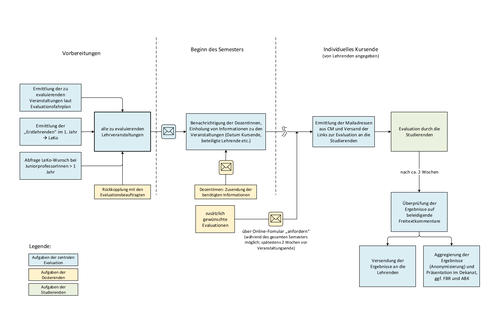Department of Biology, Chemistry, Pharmacy
Service Navigation
Decentralized Evaluations of Lecturers and Courses
In addition to the central surveys, each department evaluates its lecturers and courses. The basis for this is the Berliner Hochschulgesetz (BerlHG), the evaluation guideline of Freie Universität Berlin and the evaluation concept of the Department of Biology, Chemistry, Pharmacy, which was passed by the Departmental Council in 2018.
Information for students
Each semester a number of courses are selected for evaluation.
Once these courses have finished, an email is sent to the ZEDAT address of each student in these courses with a direct link to the questionnaire, available on the online evaluation portal.
We try to select the courses in such a manner that students are not overwhelmed by too many requests at one time. The goal is to limit invitations to no more than three per semester.
Information for Teaching Staff
If you have any questions, please do not hesitate to contact us by email.
Our evaluation guidelines require you to have all of your integral courses evaluated on a regular basis. An immediate benefit of this process is that you receive feedback directly from your students.
- Because it is an anonymous survey, the feedback you get is unfiltered and honest.
- You will learn in which areas students rate your teaching positively and where they see room for improvement.
- You can use the results as a foundation to build on your teaching skills with the help of further training.
- Plus, you can use it as proof of your aptitude in teaching in job applications.
Integral courses should be evaluated at least every two years (please see our evaluation guidelines for further details). Generally speaking, the department council decides which courses are evaluated and when.
- Planned Evaluations in the 2022 Summer Semester
Teaching staff at the Department of Biology, Chemistry, Pharmacy can request an evaluation at any time, regardless of the evaluation plan. A request form is available online.
If your course has not been scheduled into the evaluation plan or was not considered until the very last minute, then you can also request a “voluntary evaluation” via the online form or by email. Please get in touch with us at least two weeks before your course is set to finish.
We have provided a simple diagram of the evaluation process here (in German). As teaching staff you will not be asked to do very much additional work. We just need you to provide some important details about your course at the start of the semester, such as the date the course finishes and the names of all teaching staff participating in it.
A department-wide evaluation questionnaire that takes into account the specificities of biology, biochemistry, chemistry, and pharmacy as subjects has been used since June 2014. Representatives from all status groups (including students) developed the questionnaire in a working group organized by the education commission. It was then approved by the Staff Council of Freie Universität and adopted by the department council of the Department of Biology, Chemistry, Pharmacy.
The questionnaire sections can be used in conjunction with each other for different course and module types. Sections about online teaching materials or examinations can also be included.
Examples:
A questionnaire for a module made up of a lecture and practice sessions with a subsequent examination includes the following sections:
Introduction + Lecture + Practice Session + Examination + Conclusion
A questionnaire for a seminar without an examination includes the following sections:
Introduction + Seminar + Conclusion
When putting together the questionnaire sections, we use the course types listed in the course catalog as a guide. We are also able to adjust these, so please get in touch if your course type varies from what is stated in the course catalog.
Questionnaire sections:
The evaluations are mostly carried out online via the evaluation portal of Freie Universität. In very few cases are they paper-based. Students receive a direct link to access the online questionnaire by email, which allows them to participate in the course survey only once. The student administration system is used to determine students’ email addresses, though in rare cases they may be requested directly from the teaching staff. This is why it is important for students to have signed up for the course on Campus Management. The evaluations are created and analyzed using the program Unizensus, which allows the data to be anonymized and processed.
In keeping with the university’s evaluation guidelines, we attach strong importance to evaluating academic staff who are teaching for the first time. This approach allows new instructors to rapidly acquire experience and aptitude in this area. The Department of Biology, Chemistry, Pharmacy at Freie Universität Berlin evaluates every instructor who is holding a lecture or seminar for the very first time.
Unlike the other surveys, these questionnaires are done on paper. The questionnaire for assessing teaching competence (LeKo) was developed and validated at Freie Universität Berlin. It is based on indicators for assessing quality teaching and includes the following aspects:
- Imparting knowledge and supporting understanding
- Motivating students
- Guiding and mediating interactions between group members
The results of the surveys may also be used as input for further training at the Dahlem Center for Academic Teaching.
Personalized results are shared with instructors only. Aggregated, fully anonymized reports may also be discussed in committees or otherwise published.
You can find further information under the “Legal Basis” section.
However, instructors are free to discuss the results with colleagues and students in particular, as this also contributes to greater acceptance of the evaluations.
The department council also uses the aggregated results and involves students in analyses and discussions where appropriate; for example, in the regular meetings of the department council and in the meetings of the education commission.
Legal Basis
Excerpts from the evaluation guidelines of Freie Universität Berlin:
- All members of Freie Universität Berlin are required to participate in evaluations. (Section 1)
- Evaluations serve the purposes of internal assessment and further development of the quality of the university’s education programs and modes of instruction, the promotion of quality awareness and constructive dialogue within the university, and internal and external accountability. (Section 2)
- Course evaluations are carried out on a regular basis at Freie Universität Berlin. The purpose of course evaluations is to provide teaching staff with specific feedback on individual courses from the students’ perspective. (Section 8)
- The dean’s office and committees, where applicable, receive anonymized results of the course evaluations from a given semester. These evaluations shall not be used to enforce personnel measures with negative effect. (Section 10)
- The students of a department or central institute shall be informed of key measures relating to quality development based on evaluation results. This may include aggregated or anonymized general results. (Section 10)
- Instructors [...] are required to participate in the implementation of the measures derived from the evaluations. (Section 1)
- All persons involved in the implementation of evaluation procedures are required to comply with data protection regulations, in particular with the Berlin Higher Education Act (BerlHG) and Berlin’s Data Protection Act (BlnDSG). (Section 11)
- Generally speaking, the integral courses of a department or central institute are to be evaluated every two years. The departments or central institutes decide which specific courses are to be evaluated over the course of each semester and how a fair distribution between individual instructors or types of courses is to be established. (Section 9)
- For academic staff who are teaching for the first time, as well as for first-time university instructors, the course evaluation shall be carried out using the questionnaire for assessing teaching competence (LeKo) – primarily in the first year of teaching. (Section 9) – further information for first-time instructors

